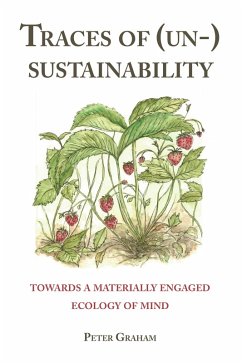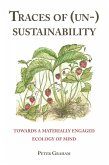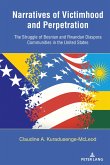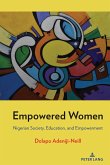Persons only develop in relation to environment, much in the same way we develop psychologically in relation to our parents and caregivers. Neither child nor parent is properly conceptualized, modelled, or understood without the inclusion of the other in the map or model of psychological/ecological development. Likewise, we perceive, think, and feel with and not just about environment and material artifacts. The achievement of sustainability then implies making changes to minds that are mediated, extended and distributed across brains, bodies, and the materiality of one's environment. Our inherited world, however broken, guides our individual and collective becoming much as a parent guides the development of a child.
The traces of (un-) sustainability perspective refutes the economistic conceptual model whereby rational economic actors are misperceived and misunderstood to have the moral right, if not the duty, to actively participate in the destruction of our collective future with ethical immunity. The presumed intelligence and naturalness of the market-based economic system is exposed as primarily a historically inherited culture-based delusion. If values and attitudes can be at least partially transformed by transforming the mundane materiality which is co-constitutive of our social mind, then an important milestone will have been achieved in our understanding of (un-) sustainability.
The traces of (un-) sustainability perspective refutes the economistic conceptual model whereby rational economic actors are misperceived and misunderstood to have the moral right, if not the duty, to actively participate in the destruction of our collective future with ethical immunity. The presumed intelligence and naturalness of the market-based economic system is exposed as primarily a historically inherited culture-based delusion. If values and attitudes can be at least partially transformed by transforming the mundane materiality which is co-constitutive of our social mind, then an important milestone will have been achieved in our understanding of (un-) sustainability.
Dieser Download kann aus rechtlichen Gründen nur mit Rechnungsadresse in A, D ausgeliefert werden.
"This book is a sweeping dance through the patterns of our history, our psychology, and how our 'environmental-parent relationship' has led us to an unsustainable world. Revealing how our material disengagement in the social world has led us to this edge, the reader is then shown how to dance more sustainably in the world with new steps to materially re-engage in different ways of relating to and becoming in the world."-Ann Dale, Royal Roads University









